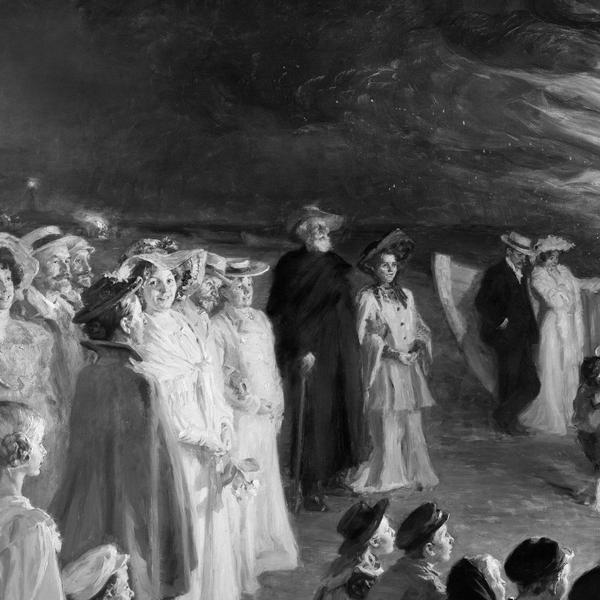
“Exhausting and terrifying, psychotic and beautiful” : The Line of Best Fit speaks to of Montreal's Kevin Barnes
-
Photo: Sebastien Dehesdin
Of Montreal‘s frontman Kevin Barnes has always been a restless spirit; after reaching the summit of his flirtations with R&B and disco on 2010′s False Priest, a record he describes now as “anthemic… but not ambitious”, Barnes was in no mood to repeat himself. “I’d already done that, it wasn’t really that interesting or exciting to do it again. I wanted to keep moving forward and experimenting and do different things.” In this case, “different things” meant an hour-long, nine-track album based on the hell of his personal life over the last eighteen months.
Let’s get this out in the open right away: Paralytic Stalks, of Montreal’s eleventh album, is not what you would call easy listening. Unless you’re the type who considers John Lennon’s primal screaming Plastic Ono Band LP or Mansun’s lost, disjointed Six to be feel-good classics. In which case you probably need help. Paralytic Stalks is a sprawling account of a man in turmoil, a relationship in decline and an artist in flux – and flooded through with an honesty to which few writers are willing to admit. It’s also quite possibly the best thing ever released under the of Montreal banner. Barnes remains understandably cagey about the specifics of some of the album’s lyrical content (tales of bloodied hair and destroyed recording gear abound) but readily admits to wanting to create a sense of space and openness on his new album. “I was definitely interested in working with longer compositions and not trying in any way to really make something commercial – y’know, not really trying to write the perfect pop song, but being more interested in experimenting and creating something that’s more transportive and more of a journey.”
With sprawling, multi-part songs that stretch out for as long as thirteen minutes, Paralytic Stalks certainly takes the listener on some kind of journey – one which takes place inside Kevin Barnes’ head. His aim for the record was “to create an atmosphere that wasn’t completely wholesome. Something raw, somewhat exhausting and terrifying, psychotic and beautiful – all of the things that make life worth living.” In fact, listening to the album on headphones may well be the closest possible approximation one could get to a brain transplant with the man himself – all sub-bass rumbles, sudden thumps of drums and shuddering vocal stutters. And that’s just the first thirty seconds of track one. If nothing else, it’s the first of Montreal album in half a decade on which Barnes allows his ideas to play themselves out to their natural conclusions, rather than interrupting himself with yet another fragment. It’s a record full of surprises, but the listener isn’t left wishing that their favourite moment of their favourite song was just that little bit longer.

The lyrics may be dark and personal (“I’m desperate for something, but there’s no human word for it!” Barnes screams on nine-minute stomper ‘Ye, Renew the Plaintiff!’), but it’s hard to reconcile these grim themes with the softly-spoken Southern gentleman on the other end of the phone. His aim as an artist has, he insists, always been “to communicate something powerful and universal – not to feel totally isolated.” Commercial concerns were certainly not at the forefront of Kevin’s mind while writing Paralytic Stalks in the same way as they were when coming up with its predecessor. “I never really go on iTunes, listen to the top ten songs and think ‘OK, I’ve got to make something like that,’ but I gave some of the songs on False Priest really conventional song titles, which I normally don’t do, just out of curiosity to see ‘Would more people hear this song if it didn’t have a really impossible song title?’”
Barnes cites his method of music making as “following organic spirits that lead me in these different directions, and not second guessing what it’s going to mean for my career,” but partly pins his approach to writing Paralytic Stalks on his literary habits at the time. “I was reading William Burroughs’ Naked Lunch, and that’s an extremely visual and wild book,” he claims. Although he didn’t attempt the technique himself, Barnes found himself enamoured with “the whole cut-up process, and the knowledge that supposedly there were three other novels – if you could call them novels, I don’t even know what word you would use for them, because they don’t follow any sort of linear narrative - that he was writing at the same time. They’re so dense with ideas and imagery, so maybe on some level I was inspired by that and wanted to create something similar with music.”
One track on which he succeeds with this method is entitled ‘Exorcismic Breeding Knife’. A neo-classical tone poem, it’s virgin territory for Barnes, and a track which will drive some listeners to obsession, others to distraction. It’s an effect Barnes is more than prepared for: “I find that exciting; I mean, what is the use of something that no one can even form an opinion on because it’s so meaningless? I think art should definitely have an element where you have to question – ‘Is this good? Is this bad? Is this fantastic?’ It should definitely give you something to think about.” Indeed, when he played the track to friends, he admits that “most people seemed to think it didn’t need to go on the record.” He laughs. “That kinda made me want to fight for it a bit more.”
It may be a track that of Montreal fans will have to learn to appreciate one way or another; a centrepiece of the album, it may well find a place in the band’s setlist for their forthcoming tour – one for which they’re planning something a little different from the “Dada comedy stage antics” for which the band have become legendary. Barnes has spent a great deal of time since finishing the album “creating visuals that enhance the music. What we’re trying to do is to transform the stage in a way that enables us to create a really complex visual experience for the audience, so it’s not just like two projection screens against a wall. There’ll be projectable spaces all over the stage, and each projectable space will have a different animation or a different set of imagery and it’s all mapped out and scripted to work with the songs.” It’s also a performance style which has influenced the initial batch of songs being rehearsed – “we don’t want to completely disregard the past, but we’re trying to find songs that will work in this context.”
To an extent, however, Barnes has disregarded his past; having been releasing records for fifteen years, there are vast swathes of his back-catalogue that he hasn’t touched in concert for years. It’s understandable that a complex sixties-indebted album like Coquelicot Asleep in the Poppies or even the more basic electronic forays of Satanic Panic in the Attic may not sit comfortably with his more recent work, but Barnes admits a slight psychological detachment from his early work. “I listened to a song off The Gay Parade - ‘Nickee Coco and the Invisible Tree’ - because I was playing it for one of the members of the band who hadn’t really heard the early stuff,” he tells me. “He could hear that it was one of my songs, but it’s weird for me because i’m so far removed from the inspiration of those early records, and to hear it… I know it’s me, and I have a really strong memory of doing it and making it, and the time period and my friends at the time and what I was reading and stuff, but I’ve just buried it deep in my memory. I hadn’t really thought about it in so long, so it sounds really funny and bizarre. It’s definitely a mystery.”
So, I ask, if you played the new album to the Kevin Barnes that was getting ready to put out the first of Montreal record in 1997, what do you think his reaction would be? “I think I would have been terrified!” he deadpans, before conceding “I think I would have recognised the way I structure things melodically and even though I probably would be totally freaked out by something like ‘Exorcismic Breeding Knife’, I think I would have probably recognised a weird, twisted, fucked-up version of myself in it. Which,” he adds, laughing nervously, “is where i’m at right now.”
Given the emotional state of the record Barnes is ostensibly promoting, it’s as encouraging a closing statement as you could hope for. Sort of.
Paralytic Stalks is available now through Polyvinyl Records.
Get the Best Fit take on the week in music direct to your inbox every Friday

Taylor Swift
The Tortured Poets Department

Chanel Beads
Your Day Will Come

Lucy Rose
This Ain't The Way You Go Out





